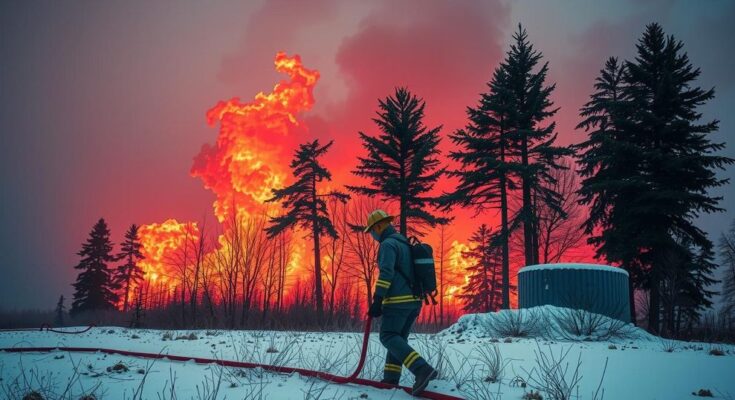Climate change is elevating fire risks in the Middle East, compelling experts to seek innovative solutions at the Intersec 2025 Fire & Rescue Conference. Predicted increases in extreme heat days and water scarcity strain firefighting operations. Key discussions will center on technological advances, emergency preparedness, and strategic water management to improve resilience against these evolving threats.
Climate change is exacerbating fire risks in the Middle East, necessitating innovative solutions and advanced technologies in firefighting operations. This pressing issue will be prominently featured at the Fire & Rescue Conference during Intersec 2025, scheduled for January 14-16 at the Dubai World Trade Centre. Experts will convene to address challenges posed by rising temperatures, water scarcity, and increased wildfire threats across urban and industrial landscapes in the region.
The Middle East is experiencing dramatic shifts in climate, with projections indicating a rise in extreme heat days. By 2050, the United Arab Emirates is expected to witness between 133 and 144 extremely hot days annually, while Saudi Arabia may experience 108 to 124 such days. These trends, coupled with prolonged drought conditions, are straining firefighting resources and contributing to a heightened risk of wildfires, even in areas with limited vegetation.
Dana Nassif, Senior Consultant for Fire & Life Safety at WSP Middle East, remarked on the challenges presented by insufficient water supplies for firefighting: “Rising temperatures and droughts are increasing fire risks across the Middle East. Water scarcity poses a significant challenge for firefighting systems, particularly as urban areas expand. Addressing these risks will require sustainable water strategies, advanced fire technologies that utilize artificial intelligence (AI), and resilience in building designs.”
According to a 2020 study by Think Hazard, both the UAE and Saudi Arabia face an increased threat of water scarcity, expecting droughts to occur approximately every five years. Paul Jennings, Assistant Fire Commissioner at Red Sea Global, emphasized the importance of safety in response operations: “At Red Sea Global, ensuring the safety and well-being of our guests is our top priority. We take this responsibility very seriously and have implemented comprehensive in-house emergency response protocols to address any potential situations swiftly and effectively.”
To combat these challenges, the UAE and Saudi Arabia are proactively enhancing their resilience against climate-induced fire risks. Significant initiatives include Saudi Arabia’s $6 billion investment in over 200 water projects and the UAE’s Water Security Strategy 2036, aimed at addressing water scarcity issues.
Intersec 2025 will highlight advancements and strategies critical to fire safety, covering topics such as AI-driven fire prediction technologies and compliance with existing building codes in Abu Dhabi. The event is poised to attract participation from 1,200 exhibitors across various sectors, including Fire & Rescue, Safety & Health, and Cyber Security.
Grant Tuchten, Portfolio Director at Messe Frankfurt Middle East, stated: “Intersec 2025 will provide a platform for fire safety experts, technology innovators, and decision-makers to address the growing fire risks in the Middle East. By showcasing cutting-edge solutions and fostering collaboration, we are committed to advancing resilience and safety across the region.”
The upcoming conference represents an essential opportunity for stakeholders to collaborate and develop strategies that will enhance fire safety amidst the challenges posed by climate change.
The 26th edition of Intersec will occur from January 14-16, 2025, at the Dubai World Trade Centre.
The Middle East is increasingly encountering the adverse effects of climate change, which include more frequent and severe heatwaves, prolonged droughts, and heightened wildfire risks. These environmental changes necessitate significant adjustments in firefighting operations and strategies. With specialists convening at the Intersec 2025 Fire & Rescue Conference, the discussions will center on leveraging technology and innovative methods to tackle these pressing challenges and improve fire safety.
In summary, the pressing risks posed by climate change to fire safety in the Middle East are prompting urgent discussions among experts. The Intersec 2025 conference will serve as a crucial platform for addressing these challenges and exploring technological solutions essential for adapting firefighting strategies. Investments in water management and advanced firefighting technologies will be critical in enhancing the region’s resilience.
Original Source: premierconstructionnews.com




